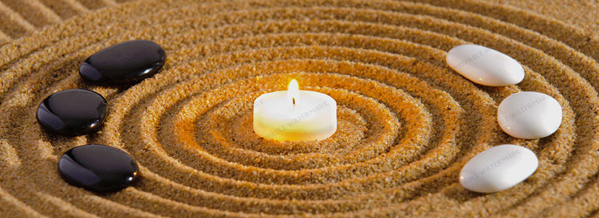Because feng shui has become so popular, many people consider the term almost synonymous with interior decorating and design. While feng shui principles can certainly be part of good interior design, there are some fundamental differences which should be considered. Interior decorating and design is primarily for the purpose of enhancing the visual aspects of a home. While a beautiful home often makes a person feel good, it doesn't really have the ability to improve your life. On the other hand, the principles of feng shui are designed to use the power of nature's elements to bring positive energy, good luck and balance into your life. Many common home decorating techniques that are perfectly acceptable in the world of interior design would be fundamentally detrimental according to feng shui principles.
Combining Feng Shui with Design
Although there are fundamental differences between interior design and feng shui this doesn't mean that the two cannot be combined in a complementary fashion. Including feng shui principles will provide a few additional challenges, but the end results will certainly be worth the extra effort. When feng shui is taken into consideration, the resulting design will be beautiful, functional, and arranged in a way that will maximize the positive energy within your home. It can help to start with some of the most important considerations, such as the positioning of the bed. The positioning of the bed is very important in feng shui It should always be positioned so that you can see the entryway door from the bed, but never positioned so that it directly faces the door. The bed should also be placed on a solid wall, and never under a window or beside the door. Using mirrors in the bedroom is also a common interior design technique, but mirrors in the bedroom, especially if they are uncovered while sleeping, can cause an energy disruption, resulting in restless sleep. If you are working with an interior designer, you should make sure they are aware of these guidelines, since they most likely would just choose a bed position based on visual appearance alone.
Feng Shui and Interior Design: Complementary Principles
Of course, once you take the specific requirements of feng shui into consideration, there are many areas that overlap between interior design and feng shui Clutter and disarray are the enemies of positive energy flow in feng shui and these two factors are also extremely detrimental to good interior design and decorating. The same room layout that encourages a free flow of positive energy will also make it easy to navigate and walk through the room. Feng shui also encourages good organization, not only for areas that are exposed but also for hidden areas such as cabinets, closets and shelves. Good interior design also focuses on ways to keep things organized and easily accessible. When a feng shui practitioner designs a home, they strive to achieve a balance between the five elements: Fire, Water, Earth, Wood and Metal. When these elements are taken into consideration within the home, the end result will encourage the flow of positive energy, while also producing beautiful interior design.
Professional designer Jessica Ackerman, writes for WallDecorandHomeAccents.com, and specializes in decorating with outdoor wall clocks and metal tree art.
Previous article | Next article






